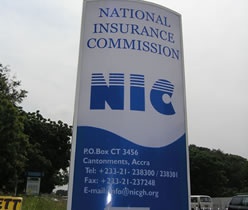The National Insurance Commission (NIC) has set April 1, 2014 to begin implementation of the “No premium, no cover” policy, which will require insurance firms to collect premiums upfront before providing insurance cover.
This follows a meeting convened at the instance of the NIC on Thursday in Accra with heads of insurances companies and brokerage firms who are members of the Ghana Insurers Association and Ghana Insurance Brokers Association.
The agreement at the meeting is for the NIC to issue a public announcement on the new policy as part of the awareness creation exercise on a policy, which is largely seen as a game-changer for the industry as insurance companies will no longer be required to sell insurance products on credit to customers.
The NIC is worried some insurance companies have resorted to unconventional practices by reporting huge amounts of outstanding premiums while at the same time making equally large amounts of provision for bad debts without significant subsequent recoveries -- thereby putting the entire industry at risk.
Figures from the operations of insurance companies last year are not available. However, available data indicate that insurance companies were owed a little over GH¢130million in premium debts at the end of December 2012; a situation that makes it difficult for insurers to honour claims when they fall due.
The debt, which is 0.35% less than was recorded in 2011, was incurred as a result of people who took various insurance covers without paying the required premium.
At the same time, claims paid by insurance companies increased by 35.8% from the previous year to GH¢99.8million at the end of 2012.
The NIC says it is concerned the outstanding premium profile could hurt the industry, necessitating the formulation of the “No premium, no cover” policy to protect the interest of all stakeholders in the insurance industry as the present practice exposes the industry to liquidity risks.
“The huge outstanding premiums have had a significant knock-on effect on reinsurers. Firstly, insurance companies are unable to pay their reinsurance premiums while the premiums remain unpaid by the policyholders. Subsequently, the reinsurers are unable to pay their retrocessionaires. This creates serious credit risk exposures for both the insurers and reinsurers.
“Secondly, when the premium debts are eventually declared bad or doubtful and have been written off, it creates complications for reinsurers as they would have already placed the business with their retrocessionaires,” the commission said.
Some insurance practitioners have told the B&FT that the practice of some insurers issuing policy covers without collecting the appropriate premium has arisen in the face of growing competition in the industry.
Industry players believe the difficulties in accessing claims when they fall due have dampened public confidence in the industry.
Currently, there are 43 insurance companies in both the life and non-life insurance sectors who are all competing in a market where insurance penetration is less than two percent.
The NIC has said that its efforts to encourage people to take up insurance policy cover will be hampered if insurers continue to undertake practices that put them in difficult situations to honour claims when they fall due.
“The current state of affairs has not only increased the credit risk of insurers, but has also introduced uncertainty in the market as to the capacity of many insurers to meet their obligations to insurance policyholders and other stakeholders.
“It has contributed significantly to the inability of insurance companies to pay claims promptly and adequately,” it added.
The NIC said it will ensure strict adherence to the “No premium, no cover” policy in a bid to bring sanity into the industry.
It said it has instituted a number of punitive measures for insurance companies that fail to adhere to the policy, including charging insurers 10 times the amount involved for granting cover without premium.
Business News of Monday, 27 January 2014
Source: B&FT
“No premium, no cover” takes off April 1













